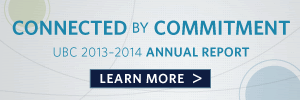Community engagement describes collaboration between institutions of
higher education and their larger communities (local, regional/state,
national, global) for the mutually beneficial exchange of knowledge and
resources in a context of partnership and reciprocity.
– Carnegie Foundation for the Advancement of
Teaching2
Engaging with external communities is not new at UBC. It has been a part
of research, teaching, service and student-led initiatives since the
institution was founded. The sidebar reflects a sampling of involved units and Community Engagement (CE) activities happening at UBC.
While CE is not a new concept, ‘why’ and ‘how’ CE is done is interpreted
in many different ways across UBC. Although many may agree with the
Carnegie Foundation definition of CE, CE is not always embraced as core to
UBC’s mission or as a scholarly activity. In contrast, Student Learning and
Research Excellence are understood and accepted as core commitments within
UBC’s strategic plan.
To be better understood and accepted across the institution, UBC needs a
strategy that brings the CE commitment to life. The strategy is the
expression of central administration’s strategic intent with respect to
UBC’s CE commitment. As such it will:
- Drive recognition of the role of CE in the university so that
together with Student Learning and Research Excellence, it is understood as foundational to UBC’s direction and identity;
- Celebrate, support and further enable community-university
engagement scholars and champions;
- Make connecting with UBC more accessible to external communities;
and
- Leverage UBC’s strengths and connections to stimulate actions that
further benefit communities locally, nationally, and
internationally.
Community-engaged learning; community-based research; knowledge & technology mobilization; international partnerships; industry collaborations; government relations; research collaborations; faculty partnerships; public events; public programs; co-op programs; public-private partnerships; internationalization; Continuing Studies; multi-institutional partnerships; 16 sustainability “living laboratory” initiatives; Centre for Community Engaged Learning – 3391 students, working with 31 departments and programs and 313 community organizations and small businesses; 3,000 Co-op students work in industry, non-profit, and government placements; 979 UILO mediated research contracts and agreements with government and non-profit organizations; more than 630,000 people travel to UBC’s Vancouver campus annually for public events and venues; 261 mobility partnerships in 41 countries; medical education partnerships with 100+ clinical teaching sites; Faculty of Medicine: General Practice Residency community programs, affiliated regional centres, community education facilities, clinical teaching sites, Centre for Excellence in Aboriginal Health; Faculty of Forestry: Forestry Co-op; Forestry Aboriginal partnerships; Faculty of Law: international partnerships; Pharmaceutical Sciences Partner Appointments; Faculty of Science: Beatty Biodiversity Museum, Botanical Garden, Nitobe Garden, Pacific Museum of the Earth, TRIUMF Saturday Morning Lectures, UBC Faraday Science Show, Life Sciences Workshops, GEER Up! Summer Camps, Science 101, aboriginal science education initiatives, Science Co-op; Faculty of Dentistry: children’s dental program, geriatric dentistry program, volunteer community clinic program, general practice residency community program; Faculty of Land and Food Systems: tri-mentoring, internships, career fairs, community health initiative, Dairy research and education centre; Faculty of Arts: Humanities 101, Arts Co-op, School of Journalism advisory council; joint academic programs; Faculty of Applied Science: innovation strategies, engineering co-op, industry partnerships, alumni and community engagement; Sauder: business ventures, experiential learning, lifelong learning, international collaboration agreements, Sauder Africa Initiative, Ch’nook Initiative, business co-op; Faculty of Education: community field experience, rural sites of learning, refugee teacher education, Investigating Our Practices conference, Virtual Immersive Educational World; UBC-O: Distinguished Speaker Series, Community Day, Community Service Learning Program; Faculty of Creative and Critical Studies: Centre for Indigenous Media Arts; Faculty of Human and Social Development: community placements; Faculty of Management: management consulting, visiting speaker series, student mentorship; Faculty of Medicine, Southern Medical Program: integrated community clerkship program; Faculty of Education Community Engagement Showcase; Public Affairs Experts Database; Institute for Resources, Environment and Sustainability research map; UBC Global Reach; health authorities; school districts; public and private schools; local communities; provincial agencies; universities; UN agencies; businesses; donors; Knowledge Mapping; Patient and Community Voices; Downtown East Side; Ghana; China; Haida Gwaii; Learning Exchange; spin-off companies; kinesiology co-op; alumni engagement; SCARP reciprocal learning and development projects, School of Nursing advisory council; Computer Science Tech Career Fair, Industry Panels, Industry Point of Contact; Human Early Learning Partnership; Irving K Barber Learning Centre; Community Voices in Health Professional Education

